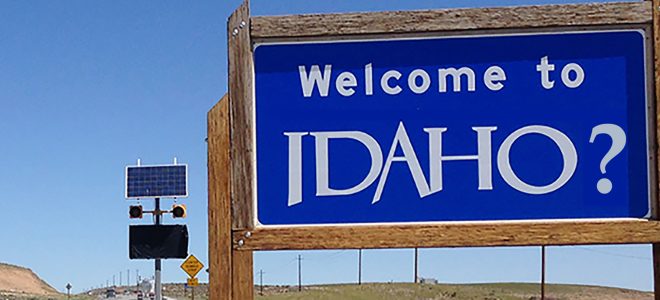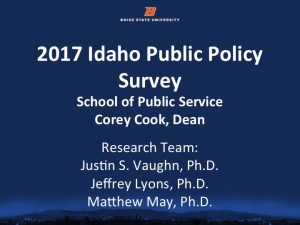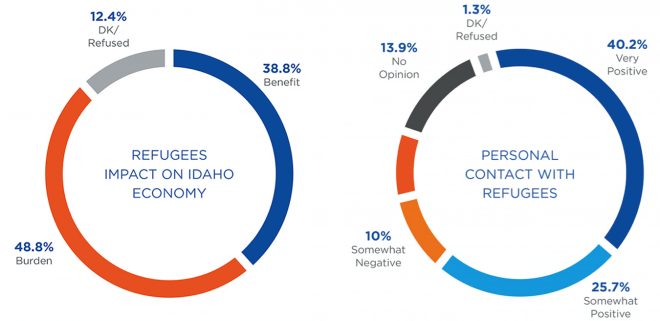

Jeffrey Lyons is an assistant professor of political science in the School of Public Service at Boise State University. His research focuses on American politics, specifically public opinion, political behavior, political psychology, and state politics. He earned his Ph.D. and M.A. at the University of Colorado at Boulder, and his B.S. at the University of Idaho.
Refugee settlement has become a hot-button issue globally and in the United States as the number of people displaced by violence and other causes has surged to historical highs in recent years. The United States has admitted more refugees in 2016 than in the few years prior, sparking a conversation about the appropriate number of refugees that should be admitted, and what the costs and benefits of resettlement are. The issue of refugees became partisan during the 2016 presidential campaign, and the election of Donald Trump has prompted controversial changes in our refugee policy.
This policy is an especially salient issue in Idaho, which has consistently ranked amongst the states who resettle the highest number of refugees on a per capita basis, and has a long history of accepting refugees dating back to the 1970’s. Since 2012, more Syrian refugees have been resettled in Boise than New York City and Los Angeles combined, and the city’s resettlement program has landed in the national spotlight. While refugee resettlement in Idaho has been successful in a number of ways, it has sparked controversy in recent years as some citizens in Twin Falls have pushed back on plans to resettle refugees from the Middle East. This raises the question of how supportive Americans – and Idahoans in particular – are of refugee resettlement programs.

Across the nation as a whole, opinions on refugees are decidedly mixed. Since the 1930’s the norm has been for more Americans to oppose refugee programs than support them, though there are certain times and certain groups of refugees that seem to garner more public support. More recent opinion polling shows that Americans are fairly evenly split on their support, though attitudes appear to rise and fall in response to the recent terrorist attacks in Europe.
Our expectations of refugee sentiments in Idaho are conflicted as there are two currents working against one another. On the one hand, Idaho is amongst the most conservative states in the nation, and as the refugee issue has become politicized and partisan, we might expect this conservative tendency to produce opposition to resettlement. On the other hand, Idaho’s lengthy and positive experience with resettlement programs could foster more supportive attitudes since those who live around and come into contact with refugees tend to hold more tolerant views.
We sought to understand how Idahoans view the refugee resettlement program in Idaho by including a short battery of related questions on the 2017 Idaho Public Policy Survey, which was conducted by the School of Public Service at Boise State University. The poll asked a representative sample of 1,000 Idaho residents a host of questions about their political and policy beliefs on topics such as education, transportation, and the environment, with a margin of error of +/- 3.1%. Specific to the issue of refugee resettlement, we asked questions about whether citizens support the resettlement program, whether they believe it has a positive or negative impact on the state’s economy, and about the interactions that Idahoans have had with refugees in their communities.
We find that Idahoans are somewhat divided on their support of resettling refugees in the state, but a slim majority (51.1%) favor this program, with a sizable minority (43.8%) of citizens opposing it. These differences are outside of the margin of error, giving us confidence that there is more support than opposition to resettling refugees in the state. While more citizens of Idaho favor this program, those who oppose refugee resettlement appear to feel very strongly about the matter. Amongst the 43.8% who oppose refugee settlement, 30.5% strongly oppose it, compared to 13.2% who somewhat oppose it.

With these overall numbers in mind, we see that certain kinds of citizens are markedly more supportive of this program than others. In general, younger Idahoans have more favorable attitudes towards refugee resettlement than older citizens. Amongst those between the ages of 18-29, 59.5% support resettlement, and for those between 30-44, 61.8% support refugee resettlement. In contrast, those over the age of 65 oppose refugee resettlement by a slim margin (53.7%). There are also geographic differences that emerge. Those in the Boise media market are the most supportive of resettlement (57.9%), while residents of northern Idaho in the Spokane media market show the lowest levels of support (42.4%). Democrats are overwhelmingly supportive of refugee resettlement (79.8%), Independents are modestly supportive (52.5%), while it is a minority of Republicans (36.7%) who support refugee resettlement.
While Idahoans are supportive of refugee resettlement in general, they hold less positive assessments of the impact of resettlement on the state’s economy. More Idahoans believe that refugees are a burden (48.8%) on the economy, than a benefit (38.8%). This difference is outside of the margin of error, lending confidence to this assessment. It also appears that Idahoans are less certain about the role of refugees in Idaho’s economy, with 12.4% responding that they don’t know what the economic impact are. Similar patterns emerge for different groups of citizens as we saw with the previous question. Younger Idahoans tend to have a rosier outlook on the economic impact of resettlement (44.5% of 18-29 year olds and 46.5% of 30-44 think it benefits the economy, compared to only 31.5% of those over 65), and Democrats tend to belief that it is largely a benefit (69.2%), while a relatively small minority of Republicans (23.3%) share that view.
The final set of questions seeks to understand how much contact Idahoans have had with our refugee population, and the impressions that they have formed through these contacts. Almost half of Idahoans (47.4%) have either had some or significant contact with refugees in their communities, while 50% have either had no contact or are unaware of any refugees in their communities. When we ask those who have had contact with refugees in their communities about whether this contact has been positive or negative, a sizable majority (66%) report that their contact has been positive, while 18.9% report that it has been negative. Notably, majorities of citizens across all age groups, both genders, all geographic locations, and all partisan groups reported positive contact with refugees. This pattern even holds amongst groups who were opposed to refugee resettlement by large margins. Amongst Republicans, we see that 51.2% report positive contact compared to 19.2% who report negative contact, and for those over the age of 65, 52.8% report positive contact compared to 19.3% who report negative contact.

In sum, there appears to be more support for refugee resettlement in Idaho than opposition. In fact, despite the conservative nature of the state that may lead us to expect higher levels of opposition, Idahoans are about as supportive of refugee resettlement as the nation at large. However, a good deal of nuance lies beneath the surface of these general attitudes.
Although economists tend to argue that refugee resettlement produces positive economic gains, Idahoans are more pessimistic than optimistic about the economic consequences of resettlement. Even amongst some groups that are supportive of resettlement in general, such as Independents and women, more see resettlement as an economic liability than an asset. However, it appears that for the (nearly) half of the state who has had contact with refugees, this has largely been a positive experience. Even amongst groups that have a negative view of resettlement in general, such as Republicans and those over 65, we see majorities reporting positive interactions with refugees. Perhaps the best way to characterize Idahoans’ views on refugee resettlement is that narrow majorities support resettlement, and that relations with refugees who are here are largely favorable, but support is not likely to be rooted in perceived economic benefits to the state.
While the future of refugee resettlement in the United States is uncertain, and Europe continues to struggle with the current refugee crisis, looking at the attitudes of the citizenry can be telling regarding the future prospects of these programs. If resettlement is going to be a viable program into the future, it will need the support of the electorate. Despite tenuous citizen support in other democracies, the results from the 2017 Idaho Public Policy Survey show that although there have been recent controversies pertaining to refugee resettlement, the program is supported by a (narrow) majority of citizens. With this in mind, the fact that those who oppose refugee resettlement appear to feel very strongly about it suggests that the issue is likely to remain contentious into the future.